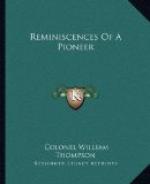After leaving Snake river we lost no more cattle. We crossed the Blue Mountains without any mishap. We met several settlers coming out with teams to help any that might be in distress. They were told to go on back, as others were behind far more in need of assistance than we. On reaching the Columbia river we found the Indians very friendly and obtained an abundance of fresh salmon. Trifles were traded for salmon and wild currants, which formed a welcome addition to our bill of fare. The dreaded Cascade Mountains were finally reached. A storm was raging on the mountain and we were advised by settlers whom we met coming out to assist the immigrants, to wait for better weather. Some disregarded the advice and paid dearly for their temerity, losing many of their cattle, and only for the help rendered by the settlers might themselves have perished.
As soon as the storm spent its force a start was made and the dreaded mountains passed in six days, and without any serious mishap. On reaching the valley we were everywhere greeted with genuine western hospitality. Vegetables were plentiful and cheap—in fact could be had for the asking. But while wheat was abundant there were no mills to grind it into flour, and we soon discovered that that very necessary article could not be had for love or money. We were therefore soon reduced to a daily diet of boiled wheat, potatoes, pumpkins and wild meat, the latter requiring but little exertion to secure. But we were as well off as anybody else, and with the remnants of clothing saved from the wreck of the desert and plains passed the winter in health and some degree of comfort.
Chapter II.
Our First Winter in the Willamette Valley.
The winter of 1852-53 will forever be memorable in the annals of pioneer days in Oregon. Indeed, nothing comparable had been experienced by immigrants in former years. Deep snows encompassed us from without, and while we were sheltered from the storms by a comfortable log cabin, and were supplied with a fair amount of provisions such as they were, a gloom settled over all. Cattle and horses were without forage and none could be had. Reduced to skin and bone by the long and toilsome journey across the plains, they were illy prepared to stand the rigors of such a winter. In this extremity recourse was had to the forest. The Oregon woods, as all are aware, are covered by long streamers of yellow moss, and in the cutting of firewood it was discovered this moss was devoured with a relish by cattle and horses.
Then began the struggle to save our stock. From early morning to night the ring of the ax was unceasing. The cattle, especially, soon learned the meaning of the cracking of a tree and bolted for the spot. To prevent them being killed by the falling trees, the smaller children were pressed into service to herd them away until the tree was on the ground. The stock soon began to thrive and cows gave an increased amount of milk which was hailed with delight by the small children and afforded a welcome addition to their bill of fare—boiled wheat, potatoes, meat, and turnips.




